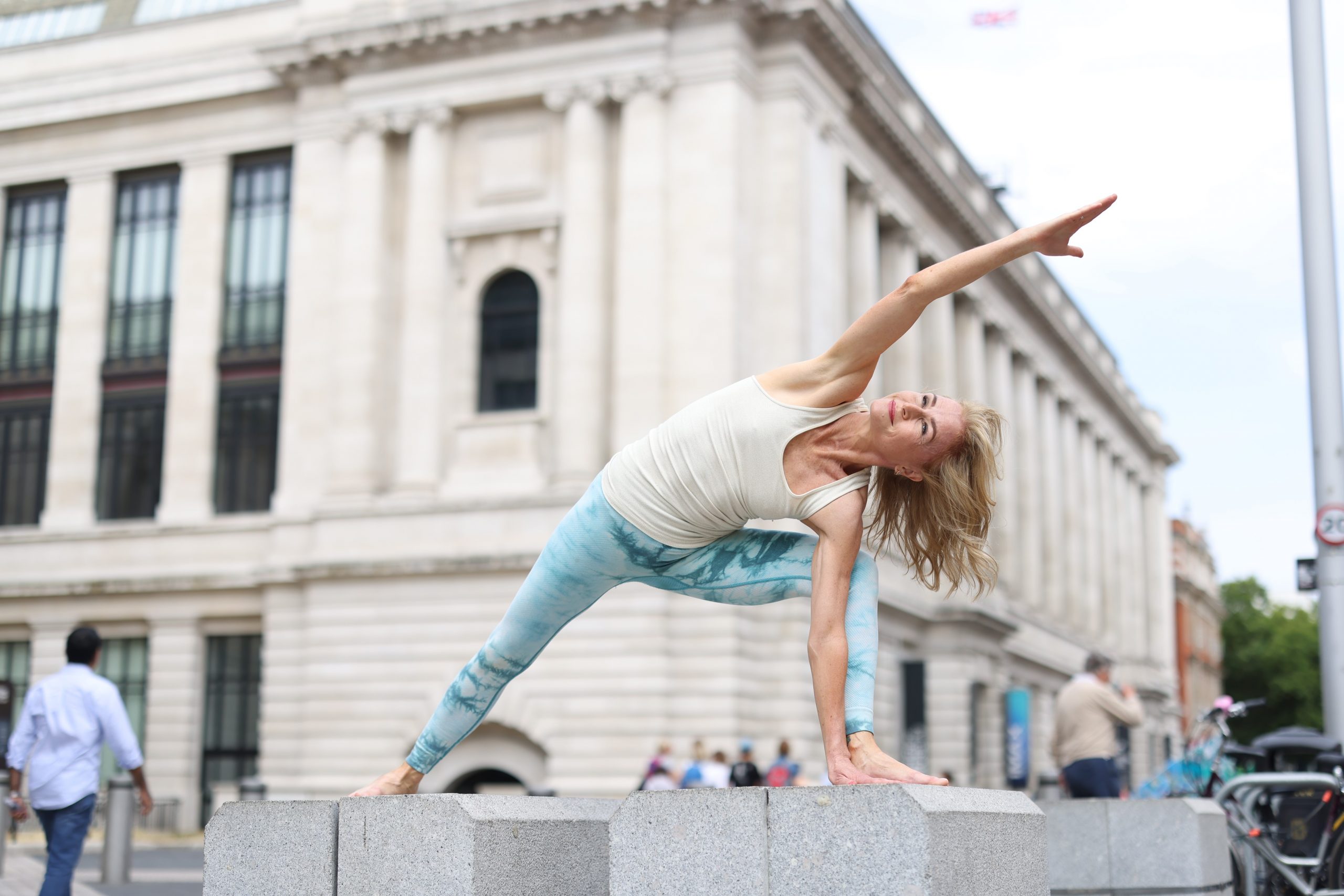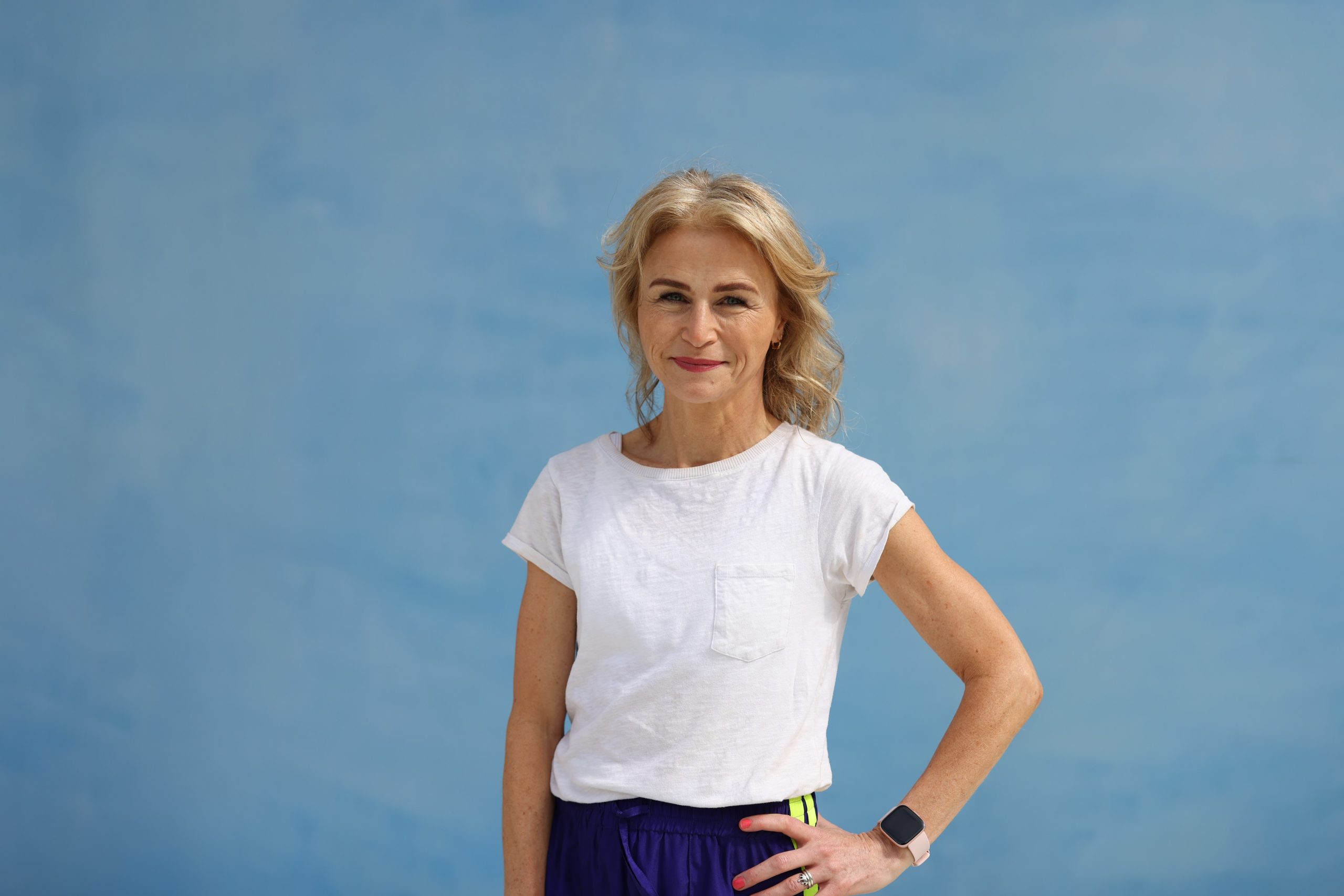When I learned that one of the UK’s leading menopause experts, Dr Louise Newson, had installed a yoga studio in her menopause and wellbeing centre, I let out a cheer. She hails her regular ashtanga yoga practice as “the most powerful and rewarding exercise to strengthen my body, keep physically fit and provide me with mental clarity and vision so I can optimally focus on my work and family.”*
I couldn’t agree more. My 20-plus years of yoga practice (16 of those as a teacher) have been a lifesaver, helping me navigate career changes, pregnancy, bereavement, stroppy teens and challenging people. Now in menopause, it’s once again my staunch ally – and I firmly believe it can be the same for everyone.
Dr Newson agrees. “For many women, I really feel that yoga is the optimal exercise, and it has so many advantages,” she says**. “With regular yoga practice some women find that their menopausal symptoms can improve and many women find that their physical strength improves. It is really important that menopausal women consider ways to improve their future bone, heart and brain health and certainly yoga will help with all of these.”*
Dr Newson and I practice dynamic style of yoga (I teach Rocket Yoga), but there are dozens to choose from. For example, I’m one of the 30 per cent of women who don’t experience hot flashes, but I do have stress to burn off and so a more fiery, dynamic style of yoga suits me. For others, certain intense poses might actually bring on a heatwave. It may be that a cooling, more gentle practice such as Restorative Yoga or Yin Yoga suits you better. Experiment until you find a style that help you make yoga a lifelong habit.

There are also specific menopause yoga classes available, developed by teacher Petra Coveney. They take a broader approach to menopause than simply poses. The focus is on reframing the transition into our post-reproductive years as a time of awakening and wisdom.
Menopause is not just a sex hormone issue, it’s a whole body-mind takeover. As a powerful mind-body practice toga meets that challenge to help bring us back into balance.
I’ve seen my body transform with regular yoga practice and I know that as I get older I’m getting stronger and learning new ways to move my body and calm my mind. Thanks to yoga, have an arsenal to tools, not just poses but breath practices and meditations, that I can pull out of the bag at times of flux to help me feel more rooted, whatever life throws at me.
Here are some of the ways yoga can help you in perimenopause and menopause:
Yoga busts your stress
Stress plays a role in the severity of symptoms and as well as going through a menopause many women also experience ‘role overload’, combining parenting with a senior role at work and managing ageing. If you experience hot flushes, you may notice they are more frequent when you are stressed.
In one study by the University of California restorative yoga was found to reduce the number of hot flushes by 31 per cent and make them 34 per cent less severe. What’s more, the women in the study lost on average three pounds and had better sleep and improved their good cholesterol. ***
Yoga strengthens your bones
Weight bearing exercises are vital for bone strength. In yoga, we support our body weight on so many parts of the body – hands, arms, legs, shoulders, sit-bones, to name a few. Since wrist fractures are among the most common breaks related to thinning bones, poses such as downwards facing dog, which strengthen the wrists can be particularly helpful, says doctor and yoga teacher Timothy McCall****.
It’s often not appreciated but “stress an osteoporosis are linked,” he adds. “Cortisol contributes to the loss of calcium from bones and interferes with new bone growth.” By doing yoga, we’re addressing stress and actively contributing to bone strength.
Yoga brings balance to body and mind
In countless studies the ability to balance on one leg has been shown to be a marker of longevity. Yoga helps balance our mind and emotions too, because unlike other forms of exercise, it’s a breathing practice above all else. When we balance out both sides of our breath, bringing the inhale and the exhale into a calm steady rhythm, we can directly impact our nervous system. “Calm steady breath, calm steady mind,” is something I say, and feel often, in my classes. The yoga breathing technique called ‘ujjayi’ or ‘ocean breath’, creates a beautiful soothing sound that helps cuts through out mind chatter and negative self-talk.
Yoga builds muscle mass
There’s a sharp decline in muscle mass during menopause. “Among its many functions, oestrogen is anabolic, in other words, it helps build muscle,” say Dr Shazadi Harper and nutritionist Emma Bardwell*****. In yoga, we don’t need weights, because there are countless ways we can use our bodyweight to grow stronger and build lean muscle without bulking up. Feeling physically strong helps you feel mentally strong, more resilient and socially confident. Yoga gets you strong on the inside too as we engage and lifting our internal muscles, particularly the pelvic floor, known as ‘mula bandha’, the root lock (and whose pelvic floor doesn’t need a bit of extra help in mid-life?) What’s more, muscle burns more calories at rest than fat so we are increasing our metabolism too!
Yoga helps us get comfortable with change
Change in life, but particularly in menopause, is inevitable, and yoga helps us not just become comfortable with change but even to enjoy the process and have the confidence to give fun new things a go. Handstand anyone? You might surprise yourself! Yoga expands our range of movement and challenges our self-limiting beliefs about what we can do as we get older. Menopause as a slide towards the inevitable, it is a time to find a new, possibly even better normal.
Victoria Woodhall is Editorial Director of getthegloss.com and a Rocket Yoga teacher. Find her free weekly classes on Instagram @victoriawoodhall
*Menopause Yoga, Petra Coveney, Foreword
** Ibid
***Yoga as Medicine, Timothy McCall MD p447
**** Ibid p445
***** The Perimenopause Solution, Dr Shazadi Harper, Emma Bardwell p238
The content of the QVC website is for information only. It is not intended as a substitute for professional medical advice, diagnosis or treatment. Always seek the advice of your doctor or other qualified health provider with any questions you may have regarding a medical condition. Never disregard professional medical advice or delay in seeking it because of something you have read on the QVC website.
We understand there’s a lot of information out there on the menopause. You can read through the NICE guidance on menopause management, as well as the NHS overview on the menopause.




